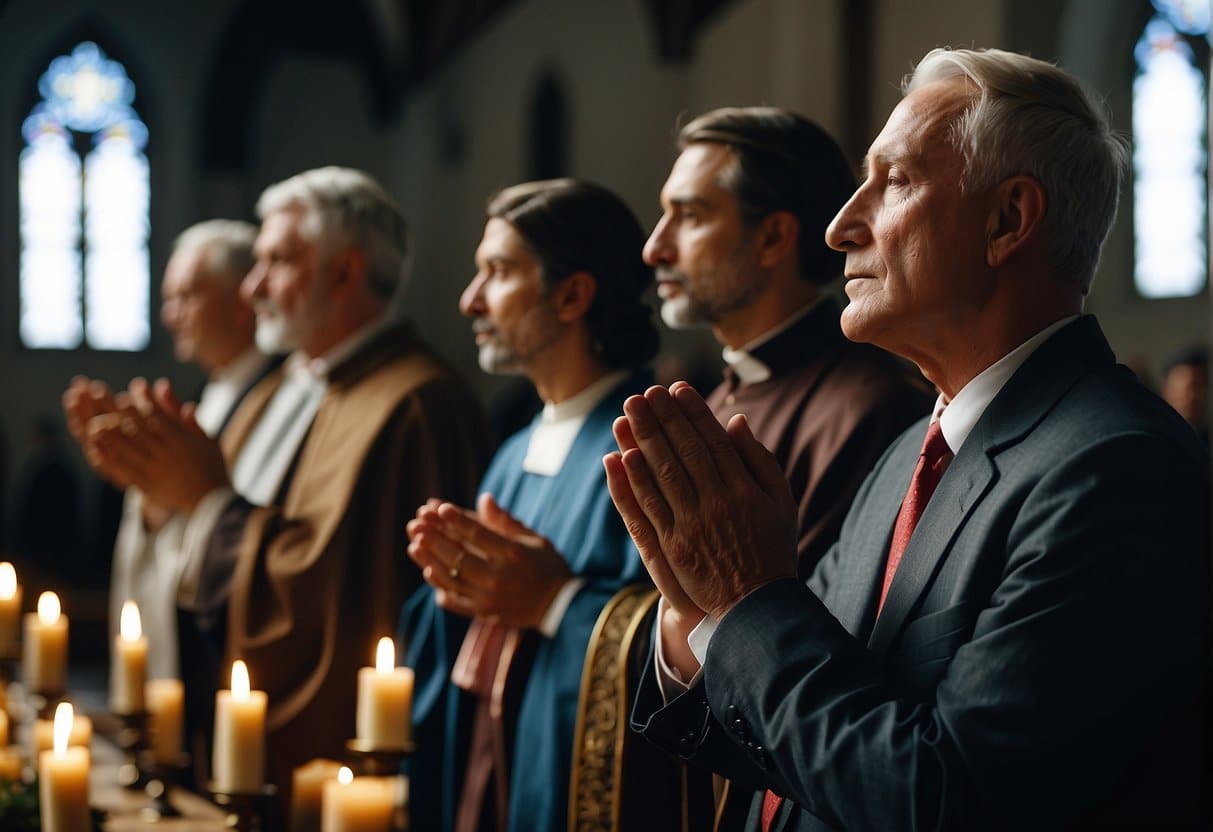If you are a Catholic, you may have wondered whether you will go to heaven. Perhaps you have heard different opinions on the matter, and you are not sure what to believe.
This article will explore the topic of whether Catholics are going to heaven. We will examine what the Catholic Church teaches about salvation and how it relates to the concept of heaven.

The question of whether Catholics are going to heaven is related to the issue of salvation.
According to Catholic teaching, salvation is a process that begins with faith in Jesus Christ and continues throughout a person’s life. The Church teaches that salvation is a gift from God that cannot be earned through good works alone.
Catholics believe that they are saved by grace through faith, and that good works are the fruit of that faith. In other words, Catholics believe that faith and works are both necessary for salvation.
So, what happens after we die? According to Catholic teaching, we are judged by God and sent to either heaven, purgatory, or hell.
Catholics believe that heaven is a state of eternal happiness in the presence of God, while purgatory is a temporary state of purification for those who are not yet ready for heaven.
Hell is a state of eternal separation from God. In the next section, we will explore the Catholic Church’s teachings on salvation and how they relate to the concept of heaven.
Theological Foundations
When it comes to the question of whether Catholics are going to heaven, the answer is rooted in the theological foundations of the Catholic Church.
Concept of Heaven
Heaven is the ultimate goal of the Christian life. It is a state of eternal happiness and communion with God, where we will experience the fullness of love, joy, and peace.
The Catholic Church teaches that heaven is not just a physical place, but a state of being in the presence of God.
Catholic Understanding of Salvation
The Catholic Church teaches that salvation is a gift from God that we receive through faith and good works.
According to the Catechism of the Catholic Church, “The grace of Christ is the gratuitous gift that God makes to us of his own life, infused by the Holy Spirit into our soul to heal it of sin and to sanctify it”.
This grace enables us to live a life of faith, hope, and love, and to cooperate with God’s plan for our salvation.
Role of Jesus and Grace
The Catholic Church teaches that salvation is made possible through the life, death, and resurrection of Jesus Christ. It is through his sacrifice on the cross that we are reconciled with God and given the gift of eternal life.
This gift is not something we can earn or deserve but is freely given to us through God’s grace.
St. Paul and St. Thomas Aquinas are two important figures in Catholic theology who have written extensively on the role of grace in salvation.
St. Paul emphasizes that salvation is a gift from God that we receive through faith and that it is not something we can earn through good works (source). St. Thomas Aquinas, on the other hand, emphasizes that while we cannot earn salvation, we do have a role to play in cooperating with God’s grace and living a life of holiness (source).
In summary, the Catholic Church teaches that salvation is a gift from God that we receive through faith and good works.
It is made possible through the life, death, and resurrection of Jesus Christ, and is freely given to us through God’s grace. As Catholics, we are called to live a life of holiness and to cooperate with God’s plan for our salvation.
Catholic Practices and Beliefs

As a Catholic, your beliefs and practices play a significant role in your spiritual journey.
The Catholic Church recognizes seven sacraments, which are considered to be visible signs of God’s grace in the world.
Sacraments and Their Significance
Baptism is the first sacrament, which marks the beginning of your journey as a Catholic. Through baptism, you are cleansed of original sin and become a member of the Church.
Confirmation is the second sacrament, which strengthens your faith and commitment to God. The Eucharist, also known as Communion, is the sacrament in which you receive the body and blood of Christ. Other sacraments include Holy Orders, Marriage, Anointing of the Sick, and Reconciliation.
Confession and Absolution
Confession, also known as the sacrament of Reconciliation, is an essential part of Catholic practice. It is a way to confess your sins to a priest and receive absolution, or forgiveness, for those sins.
According to the Catechism of the Catholic Church, “The confession of sins, even from a simply human point of view, frees us and facilitates our reconciliation with others” (source).
Eucharist and Communion
The Eucharist, or Communion, is the sacrament in which you receive the body and blood of Christ.
According to Catholic doctrine, the bread and wine are transformed into the actual body and blood of Christ during the Mass. This sacrament is considered to be the “source and summit of the Christian life” (source).
Judgment and Afterlife

Catholic Views on Judgment
As a Catholic, you believe that after you die, your soul will be judged by God based on your deeds in life.
This judgment is known as the Particular Judgment, and it is an individual judgment where the eternal destiny of the person is decided.
According to the Catechism of the Catholic Church, “each man receives his eternal retribution in his immortal soul at the very moment of his death, in a particular judgment that refers his life to Christ: either entrance into the blessedness of heaven-through a purification or immediately, – or immediate and everlasting damnation” (CCC 1022).
Concept of Purgatory
The Catholic Church teaches that after death, some souls may not be ready for heaven and need to undergo a purification process before they can enter heaven. This process is known as Purgatory.
Purgatory is not a second chance for salvation, but rather a state of being where the soul is purified of its sins and made ready for heaven.
The Catechism of the Catholic Church states that “all who die in God’s grace and friendship, but still imperfectly purified, are indeed assured of their eternal salvation; but after death, they undergo purification, so as to achieve the holiness necessary to enter the joy of heaven” (CCC 1030).
Eternal Life and Resurrection
As a Catholic, you believe in the resurrection of the body and the life everlasting. This means that after death, your body will be reunited with your soul at the final resurrection.
The Catechism of the Catholic Church states that “the ‘resurrection of the flesh’ (the literal formulation of the Apostles’ Creed) means not only that the immortal soul will live on after death, but that even our ‘mortal body’ will come to life again” (CCC 997).
In summary, as a Catholic, you believe that after death, your soul will be judged by God based on your deeds in life.
If you have lived a life of virtue and have been faithful to God, you will be rewarded with eternal life in heaven.
If you have committed mortal sins and have not repented, you will be punished with eternal damnation in hell. If you have died in God’s grace but are not yet ready for heaven, you will undergo a purification process in Purgatory before entering heaven.
Finally, you believe in the resurrection of the body and the life everlasting, where your body will be reunited with your soul at the final resurrection.
Comparative Religious Perspectives
When it comes to the question of whether Catholics are going to heaven, there are different perspectives held by various religious groups.
In this section, we will explore the comparative religious perspectives of Catholicism, Protestantism, and Evangelicalism on this topic.
Catholicism vs. Protestant Beliefs
Catholicism and Protestantism share some common beliefs about the afterlife, including the existence of heaven and hell. However, there are some differences in how they view the path to heaven.
Catholics believe that salvation is achieved through faith and good works, while Protestants believe that salvation is achieved through faith alone.
This means that Catholics believe that good works are necessary to enter heaven, while Protestants believe that faith in Jesus Christ is sufficient.
Catholicism vs. Evangelical Views
Evangelicalism is a type of Protestantism that places more emphasis on personal faith and the Bible than on tradition and sacraments.
Evangelicals believe that salvation is achieved through faith alone, and that good works are a natural result of salvation, rather than a requirement for it.
This is similar to the Protestant view of salvation, but with a stronger emphasis on personal faith.
From a Catholic perspective, both Protestantism and Evangelicalism are considered part of the broader category of “mainline” Christianity.
While there are some differences in beliefs and practices between these groups, they share a common belief in the existence of heaven and the importance of faith in achieving salvation.
In terms of religious freedom, both Catholics and Protestants generally support the right to practice one’s religion freely.
Nevertheless, there have been some recent religious freedom updates that have caused controversy, particularly in the United States.
Some religious groups have argued that certain laws and policies infringe on their religious freedom, such as laws requiring them to provide contraception coverage to their employees.
In summary, the question of whether Catholics are going to heaven depends on one’s religious beliefs.
While there are some differences between Catholicism, Protestantism, and Evangelicalism, they all share a common belief in the existence of heaven and the importance of faith in achieving salvation.
Living a Catholic Life
As a Catholic, living a moral life is essential to your salvation. This means following the Ten Commandments and the teachings of the Church.
Your conscience, guided by the Holy Spirit, can help you discern right from wrong and make decisions that lead you closer to God.
Moral Conduct and Sin
Catholics believe in the concept of sin, which is the act of knowingly doing something that goes against God’s will.
Mortal sin is the most serious type of sin and can lead to the loss of salvation if not repented of before death. Venial sins are less serious but still harm your relationship with God.
To avoid sin, it is important to cultivate a life of holiness. This involves prayer, reading Scripture, participating in the sacraments, and performing acts of charity.
Regular confession is also important to maintain a state of grace and receive the grace necessary to resist sin.
Hope, Fear, and the Reality of Suffering
As a Catholic, you have hope in the promise of salvation through Jesus Christ. However, you must also be aware of the reality of suffering in this world.
Fear of the Lord is a healthy respect for God’s power and authority, which can help you avoid sin and grow in holiness.
Suffering can be a means of purification and growth in holiness, as it allows you to share in the suffering of Christ.
However, it is important to remember that God does not will suffering for its own sake. Rather, it is a result of the fallen state of the world and can be used for good if offered up in union with Christ’s suffering.
